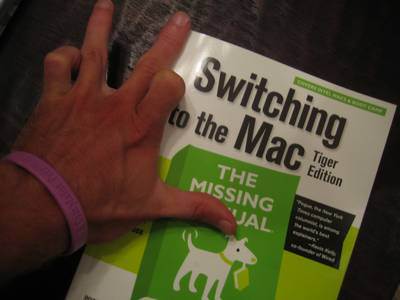
"This $@#&ing Mac will be the death of me. Intuitive, my ass."
It just slipped out, and I don't think I can be blamed. I was ready to leave the PC behind and take my Mac overseas for the first time when I couldn't figure out how to resize photos. On a friggin' Mac? I felt swindled. I also now had to move the bracelet.

For the last four months, I've been experimenting with a few types of thought experiments. The two most notable are Radical Honesty, which is 100 percent guaranteed to get you slapped or worse, and anti-complaining, which I'll explain here. The latter started in my book agent's office, where I spotted a pile of purple bracelets on his desk...
"What are these?" I grabbed one and it was inscribed with 'acomplaintfreeworld.org.'
"Another author of mine. Interesting story, actually."
And it was. The author was Will Bowen, a Kansas City minister who had recognized -- as I have in a previous post -- that word choice determines thought choice, which determines emotions and actions. It's not enough to just decide you'll stop using certain words, though. It requires conditioning.
Will designed a solution in the form of a simple purple bracelet, which he offered to his congregation with a challenge: go 21 days without complaining. Each time one of them complained, they had to switch the bracelet to their other wrist and start again from day 0. It was simple but effective metacognitive awareness training.
The effects were immediate and life-changing.
The bracelets spread like wildfire as others observed these transformations, and, to date, more than 5,900,000 people have requested the little devices.
"Can I have one?" I asked my agent.
It all made perfect sense. Fix the words and you fix the thoughts. I'm not a negative person, but I wanted to cut out the commiserating most of us use for 30-40 percent of all conversation (if you don't believe me, keep track of how many people start conversations with you in the next 24 hours that center on a complaint or criticism).
I made it 11 days on the first attempt, then I slipped. Back to zero. Then it was two or three days at a time for about a month. Once I cleared 21 days at around month 3, I no longer needed the bracelet. I'm using the bracelet again now because I'm preparing for some large projects I expect to be challenging enough for Cornholio-style meltdowns.
But what is a complaint?
This is where I disagree with some of the rules set by Will. He asks you to switch wrists whenever you gossip, criticize, or complain, and the definitions can be a bit vague. He also requires you to switch wrists if you inform someone else they are complaining. I think this is counterproductive, as I'm big on constructive criticism.
I defined "complaining" for myself as follows: describing an event or person negatively without indicating next steps to fix the problem. I later added the usual four-letter words and other common profanity as complaint qualifiers, which forced me to reword, thus forcing awareness and more precise thinking.
Following the above definition, both of the following would require a wrist switch:
"Man, I went into the post office and had to stand behind this rude jerk for 30 minutes. What a waste of time."
or
"John can be such an a**hole. Totally uncalled for."
The following variations would not:
"Man, I went into the post office and had to stand behind this rude guy for 30 minutes. It was a waste of time. From now on, I'll go in the mornings before 10 a.m. to avoid the crowd."
"John was a bit of muppet in there, wasn't he? I suppose I'll just send the e-mails directly to Mary in engineering for the next two weeks to get buy-in, then he'll have to agree."
Here are a few of the changes I noticed then and am noticing again now:
1) My lazier thinking evolved from counterproductive commiserating to reflexive systems thinking. Each description of a problem forced me to ask and answer: What policy can I create to avoid this in the future?
2) I was able to turn off negative events because the tentative solution had be offered instead of giving them indefinite mental shelf-life (and "open loop" in GTD parlance), resulting in better sleep and more pleasant conversations with both friends and business partners.
3) People want to be around action-oriented problem solvers. Training yourself to offer solutions on-the-spot attracts people and resources.
For those interested in the more sophisticated applications and results of the the no-complaint thought experiment, I recommend you order a copy of A Complaint-Free World. I received an advanced copy and finished it in one afternoon, ending up with two pages of notes.
Want to take the 21-day no-complaint challenge for a test drive now?
Last a friend checked, the bracelets had a 3-5-month waiting period, but a rubber band or other bracelet will suffice. If you want the real deal, I have four bracelets that I will mail (might take a bit, as I'm leaving the country Friday) to the best four commenters below who answer the question:
What other behavior, besides complaining, do you think people should stop? How could train themselves to stop?
For more articles like this by Tim, visit fourhourblog.com
Related and Recommended Posts: